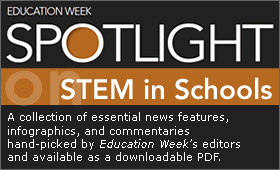Most schools have their share of math and science students who ace standardized tests, thrive during classroom discussions, and excel on independent research projects—who, in short, conquer every academic task thrown their way.
But how can schools produce more mathematics and science students with a distinct and harder-to-define skill: the ability to innovate and become future innovators in American business, science, medicine, and other areas?
That question is at the heart of work being conducted by a committee of the National Science Board, which met here last week . The board, which sets policy for the National Science Foundation, is seeking to produce a series of policy recommendations by next year for the NSF, and possibly the federal government on the whole, on how schools can produce more elite innovators in science, technology, engineering, and mathematics—known as the STEM fields.
‘A Different Breed’
Members of the committee are likely to tackle several questions. What are the cognitive and personal traits of an innovator—ability, interest, determination, curiosity, or all of them? What separates innovative ability from other, related skills, such as creativity? And can math and science classroom instruction and assessment in the United States realistically be revamped to nurture innovation among students?

Educators and policymakers have become increasingly keen in recent years on providing new and different academic challenges for elite students. Some say U.S. schools tend to focus on raising the performance of low- and middle-performing students at the expense of top-performers. Others argue the changes in the global economy make the ability to foster entrepreneurship and innovation more essential to the United States’ prosperity than ever before.
“Our economy has changed,” said Camilla P. Benbow, a science-board member who helped guide the committee’s discussion. “It’s a highly technological, knowledge-based economy,” she said, one that values “an educated workforce and the individuals who can create innovations.”
“Innovators are a bit of a different breed,” Ms. Benbow added. “What are their needs? What should our education system be doing to meet those needs?”
David Lubinski, a psychology professor at Vanderbilt University’s Peabody College, told the committee that lessons tend to emphasize verbal and quantitative ability, rather than spatial skills that can prove crucial to innovation in engineering and the physical sciences.
Schools could build spatial skills by promoting activities and projects in areas such as robotics and through lab lessons in the physical sciences, Mr. Lubinski argued.
Learners First
Science teachers could do more to spark innovation and general interest in the subject by fostering in-class discussions about scientific questions that have not yet been answered, said Robert Root-Bernstein, a professor of physiology at Michigan State University, in East Lansing. “You shouldn’t be a teacher if you can’t say, ‘I don’t know,’ ” he said, adding that teachers need to follow up by saying, “Let’s find out.”
Students also would be more inspired to think as innovators if they saw more descriptions of “real stories about real innovators” in science textbooks, added Mr. Root-Bernstein. He noted that over the past century, a common characteristic of many of the world’s top innovators has been that they received a broad-based education.
“They learned to become learners, first of all,” he said, “and learned how to do it in an extremely disciplined way.”
Many of those scientists also took a strong interest in arts, music, and other pursuits far removed from math and science, said Mr. Root-Bernstein, who has studied those scientists’ background and training.
In addition to hearing from scholars, the committee sought advice from others with relevant expertise: a panel of top-performing high school and college students.
Louis Wasserman, 18, argued that schools overlook the power they have to inspire students by daring them to become in-class inventors. Mr. Wasserman, who now attends the University of Chicago, recalled his thrill at devising innovations that he was certain were original. “I was frequently misguided,” he said, to laughter from the audience.
No matter.
“Students get excited about creating new things—it doesn’t matter if it’s actually new,” Mr. Wasserman argued. The “joy of creating something,” he said, is “extraordinary.”





